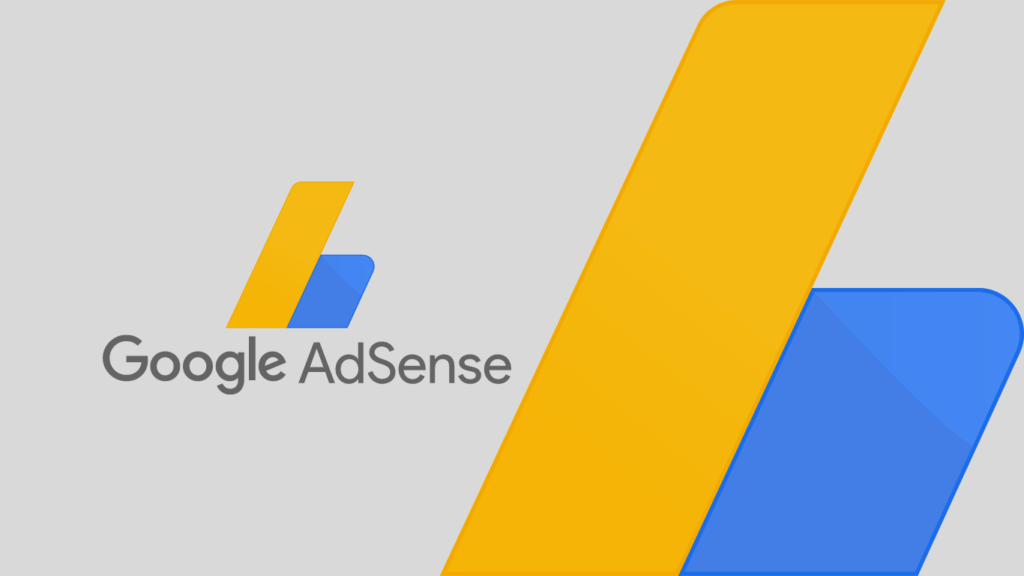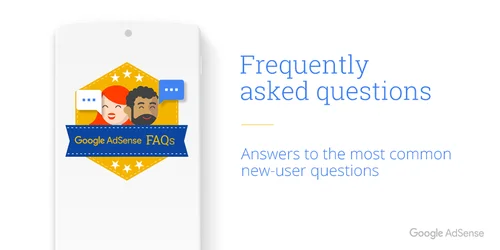Google AdSense is an advertising program run by Google that allows website owners (publishers) to monetize their content by displaying targeted ads on their websites or blogs. It serves as an intermediary between advertisers and publishers, enabling website owners to earn revenue through the placement of advertisements on their online properties.

Here’s how Google AdSense works:
Application and Approval:
- Website owners apply for the Google AdSense program.
- Google reviews the website to ensure it complies with its policies and guidelines, including content quality, originality, and adherence to Google’s terms of service.
- Upon approval, the website owner gains access to the AdSense platform.
Ad Placement:
- Once approved, publishers can create ad units within the AdSense dashboard.
- These ad units can be customized in terms of size, style, and format to match the website’s design.
- Publishers then place the provided ad code on their web pages where they want the ads to appear.
Targeted Advertising:
- Google AdSense uses contextual targeting to analyze the content of the web pages where ads are displayed.
- It delivers relevant and targeted ads based on the content, user behavior, and the visitor’s demographics.
Revenue Generation:
- Advertisers pay Google for ad space, and Google shares a portion of that revenue with the website owner whenever a visitor clicks on or views an ad (depending on the payment model – CPC for Cost Per Click or CPM for Cost Per Thousand Impressions).
Payment Process:
- Publishers accumulate earnings over time, and Google issues payments on a monthly basis.
- The earnings depend on factors such as ad quality, website traffic, and the geographical location of the audience.
Google AdSense provides a convenient and automated way for website owners to generate income from their online content without directly negotiating with advertisers. It’s widely used by bloggers, content creators, and website owners as a primary or supplementary source of revenue. However, it’s essential for publishers to adhere to Google’s policies to maintain their eligibility for the program and ensure a positive user experience on their websites.
How much does Google Ads cost?
The cost of Google Ads can vary widely depending on several factors, and it operates on a pay-per-click (PPC) auction system. Here are key factors that influence the cost of running Google Ads:
Bid Amount:
- Advertisers set a maximum bid for how much they are willing to pay when a user clicks on their ad. Higher bids increase the likelihood of the ad being shown, especially in competitive auctions.
Quality Score:
- Google considers the relevance and quality of the ad and the landing page to determine its Quality Score. Higher-quality ads can achieve better ad placements with lower costs per click (CPC).
Ad Rank:
- Ad Rank is a metric that determines the ad’s position on the search results page. It is calculated based on the bid amount, Quality Score, and ad extensions. A higher Ad Rank can lead to better ad placements.
Keywords:
- The choice of keywords significantly affects costs. Competitive keywords with high search volumes often have higher CPCs. Advertisers bid on keywords relevant to their products or services.
Industry and Competition:
- Different industries have varying levels of competition. Highly competitive industries generally have higher CPCs. The demand for specific keywords within an industry also plays a role in determining costs.
Ad Format:
- The type of ad format chosen (text ads, display ads, video ads, etc.) can impact costs. Video ads, for instance, may have higher production costs and potentially higher CPCs compared to text ads.
Geographical Targeting:
- The location where ads are shown can influence costs. Advertising in locations with higher demand or competition may result in higher costs.
Device Targeting:
- Ads may have different costs based on the device type (desktop, mobile, tablet) targeted by the campaign. Mobile CPCs, for example, can vary from desktop CPCs.
Ad Scheduling:
- The time of day and day of the week when ads are displayed can impact costs. Advertisers can adjust bids based on when they believe their target audience is most active.
How much does Google Ads pay per click?
The cost per click (CPC) in Google Ads is not fixed, and the amount an advertiser pays per click can vary based on several factors. The Google Ads system operates on a bidding model, where advertisers bid on keywords and compete for ad placements in the search results or on websites within the Google Display Network.
Here are some key factors that influence how much Google Ads pay per click:
- Bid Amount
- Quality Score
- Ad Rank
- Keyword Competition
- Industry
- Geographical Location
- Device Type
- Ad Format
How long does Google AdSense take to approve?
The approval process for Google AdSense can vary in duration, and there isn’t a fixed timeframe for how long it takes. The timeline for approval depends on several factors, and individual experiences may differ. Here are some factors that can influence the time it takes for Google AdSense approval:
Content Quality:
- Google AdSense has strict content policies. If your website or blog doesn’t meet these guidelines, it may take longer to get approval. Ensure your content is original, complies with Google’s policies, and provides a positive user experience.
Website Traffic:
- While Google AdSense doesn’t have strict traffic requirements, having some level of consistent traffic on your website can be beneficial. A website with regular traffic may be perceived as more valuable to advertisers.
Website Age:
- While there’s no official minimum age for a website to be eligible for AdSense, some users report faster approvals for older websites. However, many new websites are also approved, especially if they have quality content.
Compliance with Policies:
- Make sure your website complies with Google AdSense policies. Common issues include having sufficient content, not using copyrighted material without permission, and avoiding prohibited content.
Application Volume:
- The volume of AdSense applications received by Google at any given time can influence the approval timeline. During peak periods, such as when there’s a surge in applications, it might take longer for Google to review and process each application.
Accuracy of Information:
- Ensure that the information provided in your AdSense application is accurate and matches the details on your website. Any discrepancies or inaccuracies may lead to delays in the approval process.
It’s not uncommon for the approval process to take anywhere from a few days to several weeks. During this time, Google reviews your website and ensures it complies with their policies. You can check the status of your AdSense application by logging into your AdSense account. If your application is rejected, Google typically provides information on the reasons for rejection, allowing you to address any issues and reapply.
To enhance your chances of swift approval, focus on providing high-quality, original content, adhering to Google’s policies, and ensuring a positive user experience on your website.
How does Google AdSense pay you?
Google pays for ads through a complex and dynamic advertising system that operates on a pay-per-click (PPC) auction model. The primary platform for this system is Google Ads, where advertisers bid on keywords relevant to their target audience. Here’s a breakdown of how Google pays for ads:
Advertiser Bids:
- Advertisers participate in an auction by placing bids on specific keywords related to their products or services. These bids represent the maximum amount the advertiser is willing to pay for a click on their ad.
Quality Score:
- Google considers the Quality Score of an ad, which is determined by factors such as ad relevance, click-through rate (CTR), and the quality of the landing page. A higher Quality Score can lead to better ad placements and potentially lower costs.
Ad Rank Calculation:
- Google calculates an Ad Rank for each ad based on the bid amount and Quality Score. Ad Rank determines the ad’s position on the search results page.
Ad Placement:
- Ads are placed on the search results page or on websites within the Google Display Network based on the Ad Rank. The highest-ranking ads appear in more prominent positions.
Actual CPC (Cost Per Click):
- Advertisers are charged based on the actual CPC, which is the minimum amount needed to maintain their ad’s position relative to the next-highest-ranking ad. The actual CPC can be less than the maximum bid, depending on the competitiveness of the auction and the Quality Score.
Auction Dynamics:
- The ad auction occurs in real-time every time a user conducts a search or visits a website within the Google Display Network. The auction considers bid amounts, Quality Scores, and other factors to determine the winning ads.
Payment by Advertisers:
- Advertisers pay Google only when a user clicks on their ad. This is known as cost-per-click (CPC). If the user doesn’t click on the ad, the advertiser incurs no cost.
Other Payment Models:
- While CPC is the most common payment model, advertisers can also choose other models such as cost-per-thousand-impressions (CPM) for display ads or cost-per-acquisition (CPA) where they pay for specific actions like a purchase or form submission.
Revenue for Google:
- Google generates revenue by charging advertisers for the clicks or impressions delivered through its advertising platform. The revenue earned is a result of the total ad spend by advertisers participating in the auction.
This auction-based system allows advertisers to reach their target audience effectively while providing Google with a revenue stream based on the performance of the ads. Advertisers have control over their budgets, bidding strategies, and targeting options to optimize their campaigns for the best results.
How does Google AdSense work with bloggers?
Google AdSense and Blogger work seamlessly together to help bloggers monetize their content. Blogger, a free blogging platform owned by Google, integrates with Google AdSense, allowing bloggers to earn revenue by displaying ads on their blogs. Here’s how the process works:
Create a Blogger Account:
- If you don’t have a Blogger account, you need to create one. Visit the Blogger website, sign in with your Google account, or create a new account.
Set Up Your Blog:
- After signing in, you can create a new blog or use an existing one. Follow the prompts to set up your blog, including choosing a blog name, domain, and theme.
Content Creation:
- Start creating and publishing content on your blog. It’s important to produce original and high-quality content that adheres to Google’s AdSense policies.
Apply for Google AdSense:
- Once your blog has a sufficient amount of content and complies with AdSense policies, you can apply for Google AdSense directly from the Blogger dashboard.
- Go to the “Earnings” section in the Blogger dashboard and click on “Sign up for AdSense.”
- Follow the instructions to submit your application.
AdSense Review:
- Google AdSense will review your application to ensure that your blog meets its policies. This process may take some time, and you’ll receive an email notification regarding the status of your application.
Ad Placement:
- Once your AdSense application is approved, you can start placing ads on your blog. Blogger simplifies this process by providing built-in tools for adding AdSense ads to your blog’s layout.
- Go to the “Layout” section in the Blogger dashboard, click on “Add a Gadget,” and select the “AdSense” gadget to place ads in various locations such as the header, sidebar, or within blog posts.
Earning Revenue:
- As visitors to your blog click on or view the ads, you earn revenue. Google AdSense pays you based on a combination of CPC (Cost Per Click) and CPM (Cost Per Thousand Impressions).
Monitoring Performance:
- You can monitor your AdSense performance, including earnings, clicks, and impressions, directly from the Blogger dashboard or by logging into your AdSense account.
AdSense Optimization:
- Blogger allows you to experiment with different ad formats, sizes, and placements to optimize your AdSense earnings. You can customize ad settings to fit the look and feel of your blog.
It’s essential to note that while Google AdSense provides an opportunity for bloggers to monetize their content, it’s important to comply with AdSense policies to maintain eligibility and ensure a positive user experience on your blog. Regularly monitor your AdSense account for any updates or communications from Google.
How Much does Google AdSense pay in India?
The amount that Google AdSense pays in India can vary widely and depends on several factors. Google AdSense payments are influenced by the performance of ads on your website, the type of content you create, the geographic location of your audience, and the specific advertisers targeting your audience. Here are some key factors that can affect how much Google AdSense pays in India:
- Cost-Per-Click (CPC)
- Cost-Per-Thousand-Impressions (CPM)
- Quality and Relevance of Content
- Geographic Location
- Industry and Niche
- Ad Placement and Format
- Seasonal Trends
- AdSense Policies Compliance
Is Google AdSense worth it?
The decision of whether Google AdSense is “worth it” depends on your specific goals, the nature of your online content, and your expectations. Here are some factors to consider when evaluating whether Google AdSense is a good fit for you:
Monetization Goals:
- If your primary goal is to monetize your website, blog, or online content, Google AdSense can be a viable option. It provides a relatively straightforward way to earn revenue through ad placements.
Content Quality and Relevance:
- AdSense works best with high-quality, original content. If you consistently produce valuable and relevant content that aligns with advertisers’ interests, you are more likely to attract targeted ads and generate higher revenue.
Website Traffic:
- The amount of traffic your website receives plays a crucial role in AdSense earnings. Generally, more traffic can lead to more ad impressions and clicks, increasing your potential revenue.
User Experience:
- Consider the impact of ads on the user experience. Balancing the placement and frequency of ads with a positive user experience is essential to retain and engage your audience.
AdSense Policies Compliance:
- Adhering to Google AdSense policies is crucial. Violating policies can lead to penalties or account suspension. Ensure your content and website comply with the guidelines to maintain eligibility.
Niche and Industry:
- Some industries and niches may be more lucrative for AdSense than others. Highly competitive industries often have higher CPC rates, potentially leading to increased earnings.
Experimentation and Optimization:
- AdSense allows you to experiment with different ad formats, sizes, and placements. Regularly monitoring performance and optimizing based on insights can help maximize earnings.
Alternative Monetization Models:
- Consider alternative monetization models. Depending on your content and audience, other options like affiliate marketing, sponsored content, or selling products/services may be more lucrative.
Long-Term Strategy:
- Evaluate AdSense as part of your long-term strategy. While it can provide a steady stream of income, it may take time to see significant results. Patience and consistency are crucial.
Earnings Potential:
- Understand that AdSense earnings can vary. While some websites generate substantial revenue, others may earn more modest amounts. Realistic expectations are essential.
Ultimately, Google AdSense can be worth it for many content creators, especially those with a focus on providing valuable content and a growing audience. It’s important to weigh the potential benefits against any challenges or limitations and to continually assess whether it aligns with your overall goals and strategies for your online presence.
Is Google AdSense safe?
Yes, Google AdSense is generally considered safe when used according to Google’s policies and guidelines. AdSense is a reputable and widely used advertising program that allows publishers to monetize their online content by displaying ads on their websites. However, there are certain considerations and best practices to ensure a safe and positive experience with Google AdSense:
Adherence to Policies:
- It’s crucial to comply with Google AdSense policies and guidelines. Violating these policies, intentionally or unintentionally, can lead to warnings, penalties, or even account suspension. Familiarize yourself with the policies and ensure that your content and website align with them.
Content Quality:
- Google values high-quality and original content. Ensure that your website provides valuable content to users and that it doesn’t involve prohibited content such as adult content, violence, hate speech, or copyrighted material without permission.
User Experience:
- Consider the user experience on your website. Ad placements should enhance, rather than disrupt, the user experience. Avoid excessive or intrusive ads that may negatively impact your audience.
Transparency:
- Clearly disclose the presence of ads on your website to your audience. Transparency about the use of advertising can build trust with your users.
Traffic Sources:
- Google AdSense is designed for websites with organic and legitimate traffic. Avoid using methods that generate artificial or low-quality traffic, as this can be against AdSense policies.
Click Fraud Prevention:
- Be vigilant against click fraud. Click fraud involves artificially generating clicks on ads to inflate earnings. Click fraud is strictly against AdSense policies and can result in account suspension.
Security Measures:
- Take appropriate security measures for your website to prevent unauthorized access and potential misuse. Use secure and up-to-date software, employ HTTPS, and follow best practices for website security.
Regular Monitoring:
- Regularly monitor your AdSense account for any updates, communications, or policy changes from Google. Stay informed about changes in the advertising landscape and adjust your strategy accordingly.
By following these best practices and maintaining transparency, you can create a safe and positive environment for Google AdSense on your website. It’s important to note that Google takes the quality of its ad network seriously and continually works to maintain a safe and reliable platform for advertisers and publishers alike. If you have concerns or questions, referring to Google’s official resources and support channels is recommended.
When does Google AdSense update balance?
Google AdSense updates its earnings and balance information on a daily basis. The specific time of day when the update occurs may vary, but AdSense users can generally expect to see the latest data for their earnings, clicks, impressions, and other metrics within the AdSense dashboard each day.
It’s important to note that the update may not happen in real-time, and there might be a slight delay between user interactions with ads and the corresponding data being reflected in the AdSense reports. The daily updates typically provide a comprehensive overview of your account’s performance, allowing you to track your earnings and assess the effectiveness of your ad strategy.
To access the latest information about your AdSense earnings, log in to your AdSense account and navigate to the “Home” or “Reports” section. The dashboard and reports provide detailed insights into your performance, and you can customize the date range to view data for specific periods.
If you have specific questions about your AdSense account or encounter any issues related to balance updates, you can refer to the official AdSense Help Center or contact AdSense support for assistance. Keep in mind that Google may make adjustments or updates to its systems, so being familiar with the latest information from official sources is advisable.
Can Google AdSense detect proxy?
Google AdSense employs various sophisticated mechanisms to detect and prevent fraudulent activities, including attempts to manipulate or falsify traffic. While the specific details of Google’s detection methods are proprietary, it’s known that AdSense has measures in place to identify invalid clicks, click fraud, and other forms of abuse.
Regarding proxy usage, Google AdSense can detect when users or publishers attempt to use proxies to artificially inflate ad impressions or clicks. Proxies are tools that can be used to hide a user’s true IP address, making it appear as though traffic is coming from different locations. However, using proxies in an attempt to manipulate AdSense is a violation of AdSense policies.
Engaging in activities such as click fraud, using automated click-generating tools, or attempting to manipulate traffic through proxies can lead to serious consequences, including:
- Account Suspension: Google may suspend AdSense accounts found in violation of its policies.
- Loss of Earnings: Illegitimate activities can result in the loss of accrued earnings.
- Ban from the Program: Repeated violations or severe breaches of policies can lead to a permanent ban from the AdSense program.
It’s important to emphasize that a genuine and sustainable approach to using AdSense involves creating high-quality content, adhering to policies, and attracting organic, legitimate traffic. Attempting to manipulate AdSense through proxies or other means not only risks severe consequences but is also contrary to ethical and legal standards.
If you have concerns or questions about specific activities or practices related to AdSense, it’s recommended to refer to the official AdSense Help Center or contact AdSense support so as to get clarification and guidance. Always operate within the boundaries of AdSense policies to maintain a positive and long-term relationship with the program.
The Verdict
In conclusion, Google AdSense is a valuable monetization tool for publishers when used ethically and in accordance with its policies. While its daily updates and transparency enhance user experience, attempts to manipulate the system through proxies or fraudulent means can result in severe consequences, including account suspension and loss of earnings. Adhering to content quality, user transparency, and legitimate traffic practices ensures a positive and sustainable relationship with AdSense as a result. Publishers should prioritize creating valuable content and engaging audiences organically, fostering a trustworthy online presence for long-term success.


